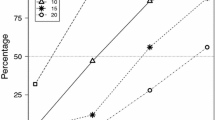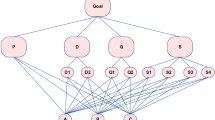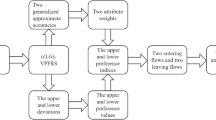Abstract
In real data sets, objects are usually measured by multiple scales under the same attribute. Many information systems are given dominance relations on account of various factors which make classical equivalence relations change accordingly. This paper investigates the optimal scale selection for multi-scale ordered decision systems based on evidence theory. Five concepts of optimal scales related to rough set theory and the Dempster–Shafer theory of evidence in multi-scale ordered information/decision systems are first defined. Relationships are then clarified among \(\ge\)-optimal scale, \(\ge\)-lower approximation and \(\ge\)-upper approximation optimal scales as well as \(\ge\)-belief and \(\ge\)-plausibility optimal scales in multi-scale ordered information systems and consistent multi-scale ordered decision systems respectively. Finally, in inconsistent multi-scale ordered decision systems, by introducing a notion of \(\ge\)-generalized decision optimal scale, relationships among different types of optimal scales are also examined.
Similar content being viewed by others
References
Bao H, Wu WZ, Zheng JW, Li TJ (2021) Entropy based optimal scale combination selection for generalized multi-scale information tables. Int J Mach Learn Cybern 12(5):1427–1437
Chen DG, Li WL, Zhang X, Kwong S (2014) Evidence-theory-based numerical algorithms of attribute reduction with neighborhood-covering rough sets. Int J Approx Reason 55(3):908–923
Chen DG, Xu WH, Li JH, Hu QH (2020) Basic course of granular computing (in Chinese). Science Press, Beijing
Chen CLP, Zhang CY (2014) Data-intensive applications, challenges, techniques and technologies: a survey on big data. Inf Sci 275:314–347
Dempster AP (1967) Upper and lower probabilities induced by a multivalued mapping. Ann Inst Stat Math 38(2):325–339
Du WS, Hu BQ (2016) Attribute reduction in ordered decision tables via evidence theory. Inf Sci 364–365:91–110
Du WS, Hu BQ (2016) Dominance-based rough set approach to incomplete ordered information systems. Inf Sci 346–347:106–129
Greco S, Matarazzo B, Slowinski R (1999) Rough approximation of a preference relation by dominance relations. Eur J Oper Res 117(1):63–83
Greco S, Matarazzo B, Slowinski R (2001) Rough sets theory for multicriteria decision analysis. Eur J Oper Res 129(1):1–47
Greco S, Matarazzo B, Slowinski R (2002) Rough approximation by dominance relations. Int J Intell Syst 17(2):153–171
Greco S, Matarazzo B, Slowinski R (2007) Dominance-based rough set approach as a proper way of handling graduality in rough set theory. Transactions on Rough Sets VII. Lect Notes Comput Sci 4400:36–52
Gu SM, Wu Y, Wu WZ, Li TJ (2014) Knowledge approximations in multi-scale ordered information systems. In: Proceedings of International Conference on Rough Sets and Knowledge Technology, October 24-26, 2014, Shanghai, China. Lecture Notes in Computer Science, vol 8818. Springer, Berlin, pp 525–534
Hu CX, Zhang L (2021) Dynamic dominance-based multigranulation rough sets approaches with evolving ordered data. Int J Mach Learn Cybern 12(1):17–38
Huang B, Wu WZ, Yan JJ, Li HX, Zhou XZ (2020) Inclusion measure-based multi-granulation decision-theoretic rough sets in multi-scale intuitionistic fuzzy information tables. Inf Sci 507:421–448
Huang QQ, Li TR, Huang YY, Yang X, Fujita H (2020) Dynamic dominance rough set approach for processing composite ordered data. Knowl Based Syst 187:104829
Huang ZH, Li JJ, Dai WZ, Lin RD (2019) Generalized multi-scale decision tables with multi-scale decision attributes. Int J Approx Reason 115:194–208
Li F, Hu BQ (2017) A new approach of optimal scale selection to multi-scale decision tables. Inf Sci 381:193–208
Li JH, Wang F, Wu WZ, Xu WH, Yang XB, She YH (2021) Review of multi-granularity data analysis methods based on granular computing (in Chinese). J Data Acquis Process 36(3):418–435
Li WK, Li JJ, Huang JX, Dai WZ, Zhang XP (2021) A new rough set model based on multi-scale covering. Int J Mach Learn Cybern 12(1):243–256
Liang JY, Qian YH, Li DY, Hu QH (2015) Theory and method of granular computing for big data mining (in Chinese). Sci Sin Inf 45(11):1355–1369
Lin TY, Yao YY, Zadeh LA (2002) Data mining, rough sets and granular computing. Physica-Verlag, Heidelberg
Lingras PJ, Yao YY (1998) Data mining using extensions of the rough set model. J Am Soc Inf Sci 49(5):415–422
Miao DQ, Li DY, Yao YY (2011) Uncertainty and granular computing (in Chinese). Science Press, Beijing
Pawlak Z (1991) Rough sets: theoretical aspects of reasoning about data. Kluwer Academic Publishers, Boston
Pedrycz W, Skowron A, Kreinovich V (2008) Handbook of granular computing. Wiley, New York
Shao MW, Zhang WX (2005) Dominance relation and rules in an incomplete ordered information system. Int J Intell Syst 20(1):13–27
Shafer G (1976) A mathematical theory of evidence. Princeton University Press, Princeton
Susmaga R (2014) Reducts and constructs in classic and dominance-based rough sets approach. Inf Sci 271:45–64
Wang HR, Li WT, Zhan T, Yuan KH, Hu XC (2021) Multi-granulation-based optimal scale selection in multi-scale information systems. Comput Electr Eng 92:107107
Wu WZ, Gu SM, Wang X (2015) Information granules in multi-scale ordered information systems. In: Proceeding of the 2015 International Conference on Machine Learning and Cybernetics, Guangzhou, China, July 12-15:182–187
Wu WZ, Leung Y (2011) Theory and applications of granular labelled partitions in multi-scale decision tables. Inf Sci 181(18):3878–3897
Wu WZ, Leung Y (2013) Optimal scale selection for multi-scale decision tables. Int J Approx Reason 54(8):1107–1129
Wu WZ, Leung Y, Zhang WX (2002) Connections between rough set theory and Dempster–Shafer theory of evidence. Int J Gen Syst 31(4):405–430
Xie JP, Yang MH, Li JH, Zheng Z (2018) Rule acquisition and optimal scale selection in multi-scale formal decision contexts and their applications to smart city. Future Gener Comput Syst 83:564–581
Xu WH, Zhang XY, Zhong JM, Zhang WX (2010) Attribute reduction in ordered information systems based on evidence theory. Knowl Inf Sci 25(1):169–184
Yao YY, Lingras PJ (1998) Interpretation of belief functions in the theory of rough sets. Inf Sci 104(1–2):81–106
Zhan JM, Zhang K, Wu WZ (2021) An investigation on Wu-Leung multi-scale information systems and multi-expert group decision-making. Expert Syst Appl 170:114542
Zhang M, Xu LD, Zhang WX, Li HZ (2003) A rough set approach to knowledge reduction based on inclusion degree and evidence reasoning theory. Expert Syst 20(5):298–304
Zhang XQ, Zhang QH, Cheng YL, Wang GY (2020) Optimal scale selection by integrating uncertainty and cost-sensitive learning in multi-scale decision tables. Int J Mach Learn Cybern 11(5):1095–1114
Acknowledgements
This work was supported by grants from the National Natural Science Foundation of China (grant numbers 61976194, 41631179 and 62076221).
Author information
Authors and Affiliations
Corresponding author
Additional information
Publisher's Note
Springer Nature remains neutral with regard to jurisdictional claims in published maps and institutional affiliations.
Rights and permissions
About this article
Cite this article
Zheng, JW., Wu, WZ., Bao, H. et al. Evidence theory based optimal scale selection for multi-scale ordered decision systems. Int. J. Mach. Learn. & Cyber. 13, 1115–1129 (2022). https://doi.org/10.1007/s13042-021-01438-x
Received:
Accepted:
Published:
Issue Date:
DOI: https://doi.org/10.1007/s13042-021-01438-x




